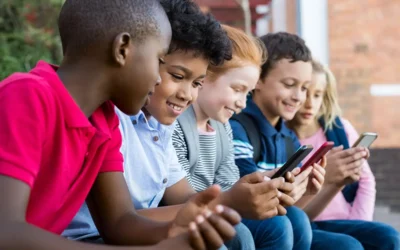Children today have little control over their digital footprint and are being increasingly exposed to greater risks online.
The COVID-19 pandemic has undeniably been a contributing factor, with 65.4 million abusive photos and videos reported in 2020 in the US alone – almost as many images as the number of children living in that country. Unsurprisingly, most of these reports came from the big tech providers, including Facebook, Google and Apple.
The ‘Sharenting’ phenomena continues to also contribute both from parents and schools, making access to children’s photos and videos online easier:
- 82% of parents on social media say they do ‘Sharenting’ as an easy way to share photos and videos with family and friends
- Schools have shared millions of photos over the last 10 years via their public websites and social media pages under the guise of “parent engagement” and/or marketing
A new online trend emerged late this year in the form of self-generated content by children, making it even harder to protect this vulnerable group. The AFP sent a warning out to parents in September making them aware of this fast growing online child abuse trend called ‘capping’ where children are tricked and preyed upon across all social media and video streaming sites, and another warning was sent out only a couple days ago highlighting this activity had entered a new low.
Parents also contacted me to say they were concerned their school was not taking student image privacy seriously. I heard stories where staff continued to publish student photos and videos in mainstream public channels without collecting the proper consent or considering the possible affects such public disclosure might have on a child or their family’s privacy (at the same time, other schools were overwhelmingly committing themselves to better image protection practices).
Alongside all of this, there’s been movement from the big techs (i.e., Facebook, Google, Apple) to modify their services to better protect children. Facebook even changed its name to try and disassociate itself from the harm it had already caused to children over the last nearly 20 years, yet end-to-end encryption continues to be a contentious child protection topic.
Wired recently wrote an interesting piece on the trade-offs currently being played by big tech on privacy versus security. It emphasised how central the global social media messaging and collaboration platforms are in our everyday lives, and the consequential harms.
“Criminality used to be local – local perpetrators, local harm and local law enforcement. Many global platforms now enable globalised criminality, from investment scams through transnational organised crime to child sexual exploitation.”
Wired UK
The article concluded that “Next year, companies and consumers will see that they are both core requirements of technology.”
Let’s hope they are right.
So, what’s the real harm in letting my school do whatever it likes with my child’s photos?
Every day for say… the past 10 years, schools have inadvertently subjected students to global public exposure when they simply post their student photos and videos on channels such as Facebook, TikTok, Twitter, and Instagram. In this way, schools have adopted student photo publishing as a daily norm, however, many schools are either still unaware of, or unconcerned about, the long-term implications for student privacy.
As someone who created a privacy technology solution for schools to provide a better, easier way to protect images of children, I think the topic of child image harm (and the privacy safeguards that must come with it) is a topic we need not only talk about strongly and consistently in 2022, but act upon.
Photo management is an essential function of schools, and student photos are used for a variety of legitimate purposes – from confirming the class roll each morning, to helping canteen staff identify which kids have allergies, to acknowledging the academic or sporting achievements of students in the yearbook. There is good, privacy-forward “purpose-built for education” alternatives to the ‘Facebook’ brand of photo management. Schools can choose to deploy such technologies – like pixevety – that support students in protecting their digital identities now and into the future, but also give parents safe, timely access.
Enabling such new privacy measures and technology for kids at school in 2022 will protect them from unwanted contact and help educate them to manage visibility of their photos, videos, and other content shared with strangers.
2021 – Pat on the back | 2022 – Pedal to the metal!
A big congratulations to schools and parents who put child privacy first in 2021.
Let 2022 be the year where we can legitimately say kids will no longer lose control over their digital identities. We can all play a part here by using and supporting services that offer privacy and data ownership by default.
The pandemic may be winding down, but it did open opportunities for schools to better engage with parents and students “virtually” – as parents, we just need to ensure these new platforms used by schools are built on privacy by design.
and finally…A big thank you!
By the close of 2021, pixevety witnessed more of our schools – secure in using our platform – start to release their private photo galleries to their parents and students to enjoy. In fact, I am excited to share that this year ended up being the best year for our team at pixevety, with positive feedback all round from schools and parents alike – THE BIGGEST SCHOOL SIGN-UP YEAR SINCE OUR INCEPTION IN 2012!
One of our school’s recently shared with our Customer Success team:
“On a side note – for our Y12 graduates we used pixevety to extract every photo – for each of our 80 grads. Feedback from parents – amazing! Just a note to say thanks for helping us produce this tremendous gift to our Y12 cohort. Couldn’t have done it without you. Please feel free to share the idea/feedback with other clients.”
Another prominent school noted:
“pixevety is the Christmas gift that continues giving”.
A massive thank you to all our staff, clients, and partners for supporting us during this pandemic, and – on a side note – if you are looking for a new career opportunity delivering bucket loads of purpose, yes, we are HIRING in both Customer Success and Developer roles!!! Feel free to reach out for a chat.
I wish everyone a very safe and Happy New Year!
Colin.



